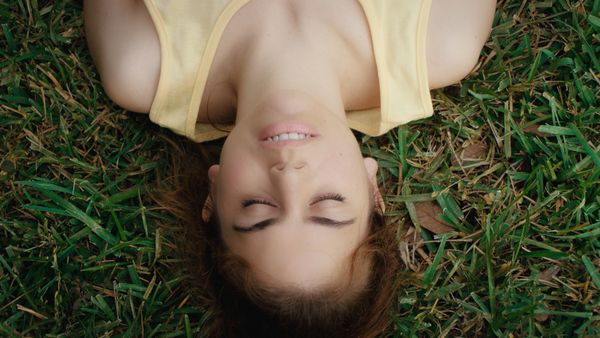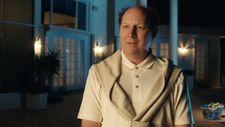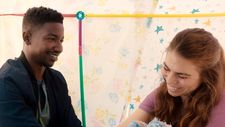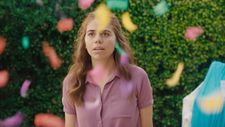 |
| Megan Seely in Puddysticks |
When I meet Megan Seely, she’s staying in a hotel room, on the verge of setting off for Brazil, a country she has never visited before. Her début feature film, Puddysticks, is screening at Fantaspoa. She wrote, directed and stars in it, as put-upon game designer Liz, a young woman who seeks refuge in a curious group of people who believe in using play to deal with the stress in their lives. Although there are definitely sinister elements to the film, it’s very positive about the potential of play in itself, and that’s something that Megan feels personally passionate about.
“I think of the classic The Shining: ‘All work and no play,’” she says. “I grew up with a dad who used to be a children's psychiatrist. The sense of play is tied to therapy and growth. And also, I was in an acting class for six years with everyone in my classes in their sixties or seventies, and it was all about being adults playing the child game of make believe at a higher level, stretching our imagination and doing all the things that we did as kids. We're still the same people. We're just in bigger bodies.”
The play actually seems to help Lizz to become more confident and move forwards in her life.
“Yeah, yeah. I think it's important to show hope in this world. If it was all terrible or it's all for nothing, or this person's pure evil or this is pure good – I don't need to keep perpetuating those myths.”
Her workplace seems pretty grim, though, treating fun as a commodity. Where did that come from?
 |
| Dan Bakkedahl in Puddysticks |
Megan laughs. “Well, I worked at a talent agency when I was 19, and that was kind of influential. Just the idea of being on the periphery of fun, when you're so close to your dream and you're creating something that's so enjoyable for other people, and just that dichotomy with this workplace where none of these adults are having any sort of fun, but they're creating such joy for children. I thought that was a really interesting dynamic. And then also, as a creative person, I don't want to make a movie about somebody making movies. So I was like, ‘Oh, games! That's another thing. I can relate to what that's like.’”
The opening scenes establish this well – and, i suggest, do a good job of setting up the tone of what follows.
She nods. “I think I needed to set the logic at the beginning. So we're with Liz, we're inside her social anxiety, and we can go on the ride with her and it's going to be like our reality, but a little elevated. That's the beginning of the movie is the most paranoid part of the whole thing.
“I used to be the assistant to the director of Martha Marcy May Marlene. I think I probably was influenced by cults just because that was such a big influence on my life. But I based it more on my own experiences. I did this thing in college called alternative spring break where you go to another city and you do a community service, and then at the end of every day, each person in this group will share their life story with another person. So I really based it more on just interesting group dynamics.
“I went to the University of Edinburgh for a year and I lived with 11 girls and 12 guys in these really bizarre flats. I just love group dynamics and just like different people getting together, you know? I think it is, in a way, a cult, a secret society, but it's also just like when you put different people from different parts of the world in a room, it's interesting.
“I was influenced by that acting class where I was working with a lot of people that were older and yet were all playing like children. And then I thought ‘Oh, it's interesting if Penelope's in the group too, because she's an actual child.’ I think that was important, to have that dynamic in this.”
Sylvester, the group’s leader, is an interesting character because he doesn't have the sort of flashy charisma that's usually associated with people in that kind of position. He seems more lost and slightly creepy to begin with.
“Yeah,” she agrees. “That actor [Dan Bakkedahl] is from Veep, and he's just extraordinary. He had seen my short film and we just met as people that like each other's work, but after I met him, I just started having visions of him with his peepholes up like that.” She holds up her hands, making a circle around each eye with thumb and forefinger – a gesture used by the group members in the film to show that they’re paying attention. “I couldn't get him out of my head. And I was like, ‘I think he's the best.’
 |
| Megan Seely and Mamadou Athie in Puddysticks |
“I already had the script. When I met him, I was like, ‘Oh, maybe he'd be the boss’ – James Urbaniak's role. I didn't think of him as the lead. But then I was in this weird meditation class and when I would meditate, I would have images of him as Sylvester. I was very lucky.
“My producer had worked on The Florida Project, so that's how we got Valeria [Cotto], who plays Penelope. And then I worked with Kate Geller, who's this amazing casting director in New York who did Shiva Baby, and she got Mamadou Athie, who's amazing. And then after we had some big talent on board, it became easier for other actors to say yes. So that's how James Urbaniak and Devin Druid and Ben Norris and these other actors got involved: it looked like a real project.”
How did she go about devising the games and rituals that we see in the group?
“I remember in college, I took a class about DH Lawrence where everything was about identity being contingent, and how you're different around different people. I think that was an influence on that – just the idea of looking at somebody when nobody else is watching. I think also from acting class, you learn that when you're being watched, you change. So I think that spotlight effect influences what are we behind closed doors, where Sylvester's trying to get people to act as if nobody's watching them, which is incredibly hard.
“The games of house and some of those classic children's games were just taken from my childhood. Also when they crawl upside down, that was something my brother and I used to do around the house to kind of make you feel like you're walking on the ceiling. So, yeah, life, imagination.”
There’s also quite a bit of trauma sharing in the group, but – until Liz decides to speak up – it’s all quite small stuff.
“I really wanted to put my own things in there,” she says. “I mean, some of it's imagined, but some of it's things I dealt with personally in different ways. Peter's secret, when he shares this really, you know, private ritual he used to do, I did similar things as a kid, and I think it's just so shameful when you're doing something that you don't see other people doing. I put it in because it felt like a really, really embarrassing secret and the most humiliating thing I could possibly share, but it's been interesting – when I played the film for people, they related to that. Or said ‘It's so minor, who cares?’
“I know from being inside the experience that that stuff does feel like the end of the world. It feels like you're not a normal human. Like normal humans don't do things like that – but everybody does do something like that. That’s what's so nice about art. You can see it reflected when it's your own self.”
Did they have any play or games on set to get people into the mood for it?
“We'd all hold hands and do deep breathing and that game, zip zaps; and there's some theatre games we would do. That wasn't to get people in the mood, that was more to, like, create energy in the group before Liz walks in, so it's like what would actually be happening before the cameras start rolling. But, yeah, I mean, I guess I always want it to be more – to have the time to rehearse and build. It would have been so nice to have the whole group together, like if everyone shared their secrets and we all played games, but the reality is, you know, you're meeting the actors, and then ten seconds later, you're rolling.
 |
| Megan Seely in Puddysticks |
“Because I'm in the office scenes, I'm pretty much wearing the same outfit for a lot of them. So I would just sit in my cubicle, and we set up the camera from one angle, and I would do the whole thing like a one woman show and do all the scenes back to back instead of cutting. That whole opening sequence I would do every moment at my desk and then collapse at the end. Is that weird? The one woman show from hell added to the insanity of the workstation.”
Meaning that she was sufficiently worn out for those scenes...
“Yeah. it's amazing – I'm not very athletic in real life, but when I'm shooting, I can somehow do all that again and again.”
She’s done lots of different things with her career already. What is she interested in focusing on now?
“I definitely want to keep acting. I would love to not just play my own imagination – I would love to be part of other people's visions, and just keep stretching myself as an actor and moving forward in my career. Writing new ideas for films and shows, similar dark comedy, but very different content. And I'm excited for this movie to finally get out there. It was just announced that we're the closing night film of the Lower East Side Film Festival.”
Her next project, she says, is about sex and relationships and the idea that people can change who they’re attracted to – but in the meantime, there is Fantaspoa.





















